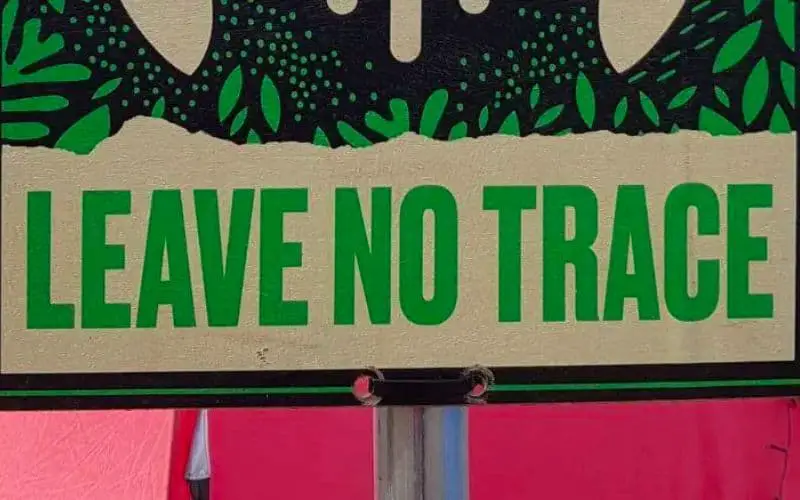There have been news stories in mainstream news this week about abandoned tents at festivals and what festivals are trying to do to stop this from happening. The problem of people abandoning their tents after a heavy weekend of partying is not new – people have been doing it for years, but it doesn’t mean it’s OK. This has to stop now.
The walk back to the car at the end of a festival is not the most enjoyable thing – no one likes it. Unlike your arrival, which was full of excitement and anticipation, this walk is full of dread, tiredness and literally the last thing you want to be doing right now.
It’s long, arduous, and you’ve had a head full of everything this weekend – so many life-changing moments!
After packing up your possessions and your dignity, you’re going to have to dismantle your tent. Leaving it behind is no longer an option (not that it ever was!)
This article explains what happens to abandoned tents and discusses some ideas about how festival organisers can prevent this from happening.
It’s a big headache for organisers, even threatening future festivals. You can do your bit by taking your tent, camping equipment and everything else home with you. The only thing you should leave behind at a festival are footprints and your dignity.
Read on…
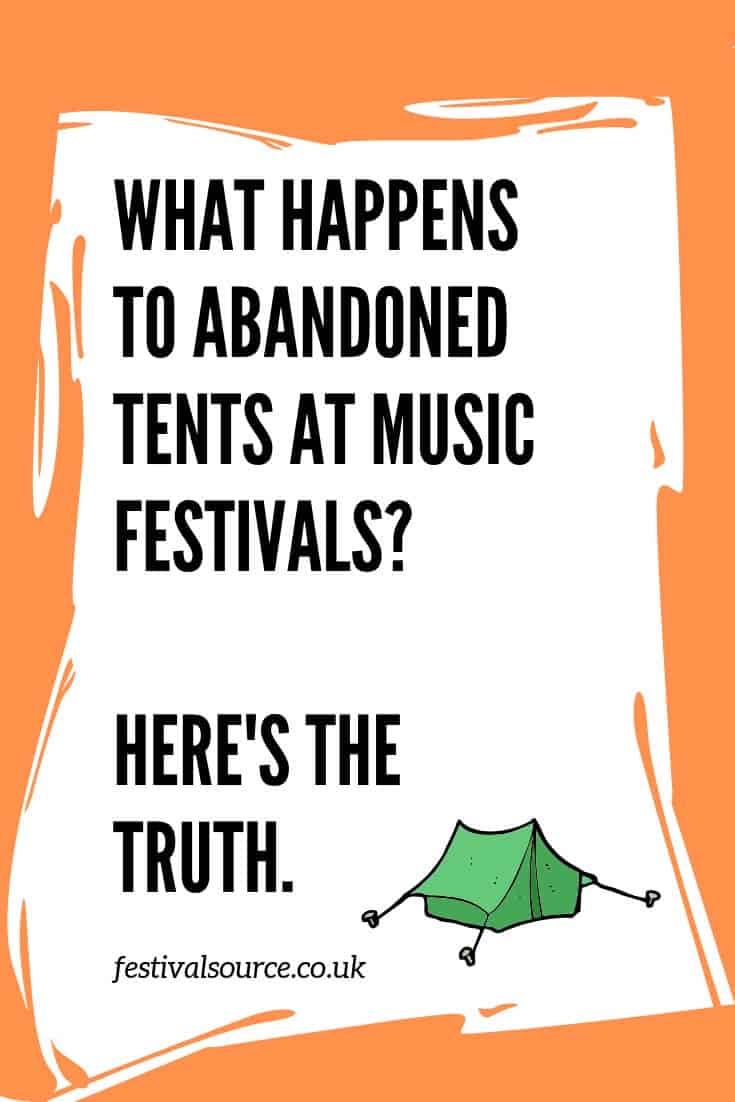
They go to Landfill, not Charity
Let’s clear this up right away: abandoned tents at music festivals do not always go to charity. This myth is actually very harmful. If festival goers think they’re doing good by leaving behind a tent, then this damaging myth has no negative consequences in their minds.
Sadly, very few abandoned tents will be donated to charity. The majority end up in landfill.
Here is why:
Tents are mixed materials. There’s plastics, fibreglass, metal, zips, pegs. Certain parts of a tent can’t be recycled at all.
Often, tents are damaged at festivals, either by negligence or by being an idiot. It’s not uncommon for people to defecate inside a tent before abandoning it for the clean-up team to find.
Would a charity want a tent that you crapped in? Absolutely not.
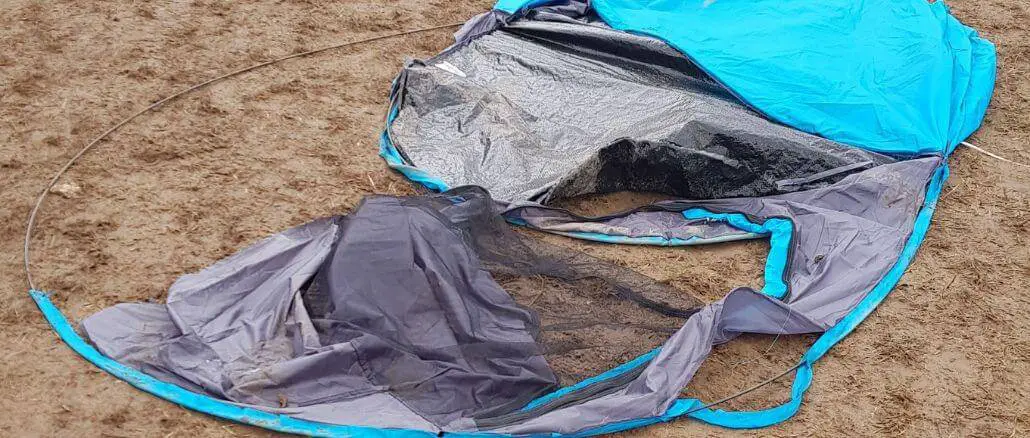
Check out the best (durable!) festival tents for 2024
It’s expensive and gruelling to clean up
If you’ve ever worked as part of a festival clean-up crew, you’ll know how difficult it is to clean up after 100,000 people.
Glastonbury in 2016 was one of the muddiest festivals to-date! It rained for weeks before the festival even started – there were a lot of abandoned tents that year due to the mud. People just couldn’t be bothered to walk back carrying their mud-splattered tent.
It took hundreds of people weeks to clean up – even then, some tent pegs were so buried in the mud, they won’t resurface until the following spring when a poor cow eats one.
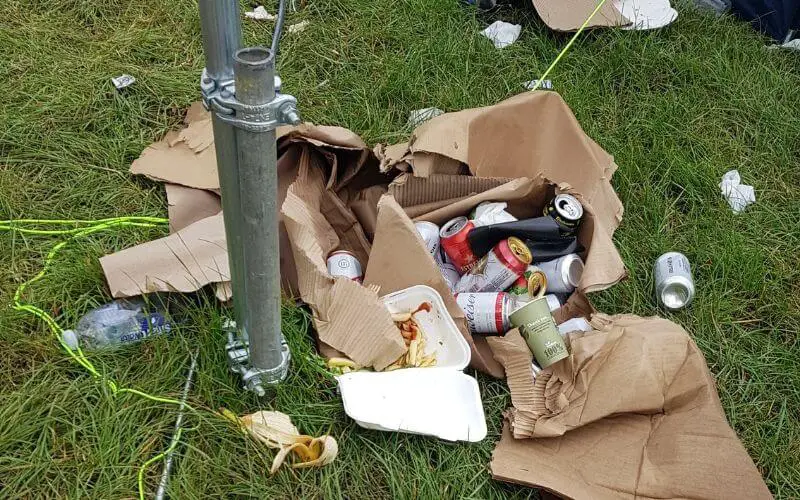
Camping shops sell tents too cheaply
It was reported by the BBC that festivals are urging shops to stop selling ‘festival tents’ due to the sheer number of them abandoned year upon year.
Tents are not Single-Use items
No way! Even cheap tents are good for multiple camping trips. You should look after your tent, hang it out to air after the festival has finished, pack it away properly and it will be perfectly good for years to come.
Why spend £30 every year on a festival tent, when you can have a tent that last year after year after year?!
Related: The Beginner’s Guide to UK Music Festivals
Related: How to Repair Your Tent Before a Festival
Related: Best Folding Camping Chairs
Abandoned tents threaten the future of festivals
A lot of planning goes into making a festival happen. Before any artists are booked or stages are designed, first of all, the festival needs an event license. This means getting permission from the Council.
Part of the event application process will include an impact assessment; someone with a clipboard will assess what the environmental impact of the event will be – litter and waste included.
If festivals have a reputation for abandoned tents, then fewer events will take place. Councils have recycling targets to meet and they just can’t allow mass-disposing of tents bound for a landfill.
Have some respect for the organisers, festival staff, landowners and nature by leaving no trace.
How Festivals can Prevent Abandoned Tents
Due to the cost and environmental impact of abandoned tents at festivals, organisers are becoming more vigilant in preventing tents being left behind in the first place.
Here are a few policies that festivals might start using to deal with this issue…
Charge a deposit per tent
One solution is to charge a deposit, say £30 per tent and £10 per chair brought into the festival. You get that deposit back when you leave providing that you’ve brought your equipment back with you.
This may sound unpopular, but it’s not about being prohibitive with high costs. This isn’t paying extra to bring a tent with you – it’s deposit.
Your money is safe and will be returned to you because you’ll carry your tent and chairs back out through the gates when you leave.
Some festivals operate an Eco-bond scheme, where you get £10 back in cash if you return a full bag of rubbish or recycling at the end of the festival. However, it’s usually limited to one per person.
Campsite patrols
Another solution is for volunteers and festival staff to patrol the campsite on the final day of the festival. They can wander around and chat to the campers who are packing up, not to lecture, but to educate those who seem to be leaving their crap behind.
Again, this might sound unpopular that people are policing and patrolling campsite areas, but it does seem that the festival-going public can’t always be trusted when left alone.
Also, the purpose here is not to lecture or punish those breaking the law, it’s to educate.
For example, asking “Are you planning to leave that tent behind? Did you know that these tents are destined for a landfill, where they will take hundreds of years to breakdown, polluting the ground, causing harm to plants and wildlife? Would you prefer to take it with you, as it’ll be perfectly good for more festivals next year?”
That’s much more effective than shouting and screaming at people.

Affordable pre-pitched tents
Festivals could take the approach by encouraging campers to purchase a pre-pitched camping spot instead of BYOT (bring-your-own-tent).
Alternatively, festival-goers could pay a deposit to ‘rent a tent’ for the weekend, returning it in once piece at the end.
This is handy for festival organisers, who would have more control over the campsites. But, it’s also a lot of work.
Most festivals do have the option of pre-pitched tents or ‘rent-a-tent’, but only for very small areas when compared to the festival as a whole.
Also, many campers prefer to bring their own tent and equipment! You can’t argue with those home comforts!
Other methods to reduce waste
In 2019, Glastonbury Festival announced that it would not be selling single-use plastic at all at the festival. This meant that all drinks would be sold in cans or in compostable cups. All food vendors were required to use non-plastic, compostable packaging, which meant that food containers could be mixed with the food waste in the same bin. Other festivals also followed this policy.
Of course, glass is also banned for safety reasons, so decanting your alcohol into plastic bottles is still a thing, and cans of still water are now are thing.
Many music festivals are also actively promoting environmental issues by partnering with organisations such as Greenpeace, Extinction Rebellion & Tree Sisters.
Repair your broken tent instead of throwing it away! Tents are fairly easy to repair if they only have minor damage, such as tears, broken poles or they’re no longer waterproof. Read the guide on how to repair your tent ready for a festival here.
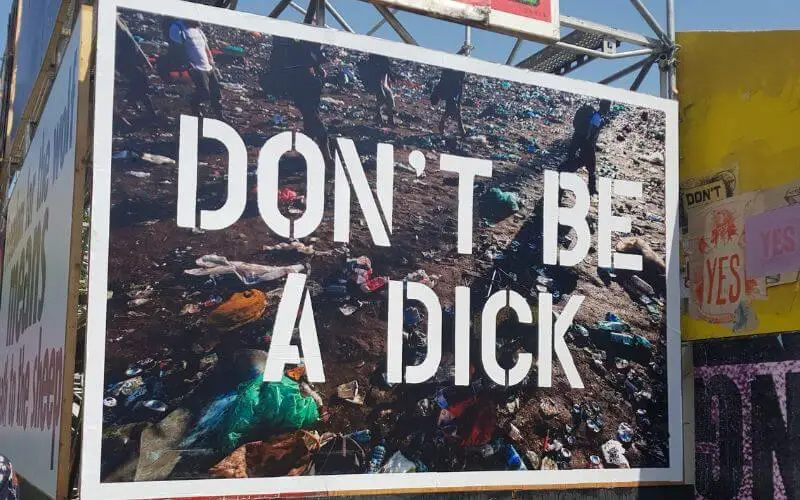
What else can festival organisers do to prevent abandoned tents? Leave your ideas in a comment below this article!
This post contains affiliate links. This means that, at no extra cost to you, we may receive a small commission if you buy a product using one of the links on this page. Read our full disclosure here.

